模块4 Unit 12 mind your manners[下学期]
文档属性
| 名称 | 模块4 Unit 12 mind your manners[下学期] |
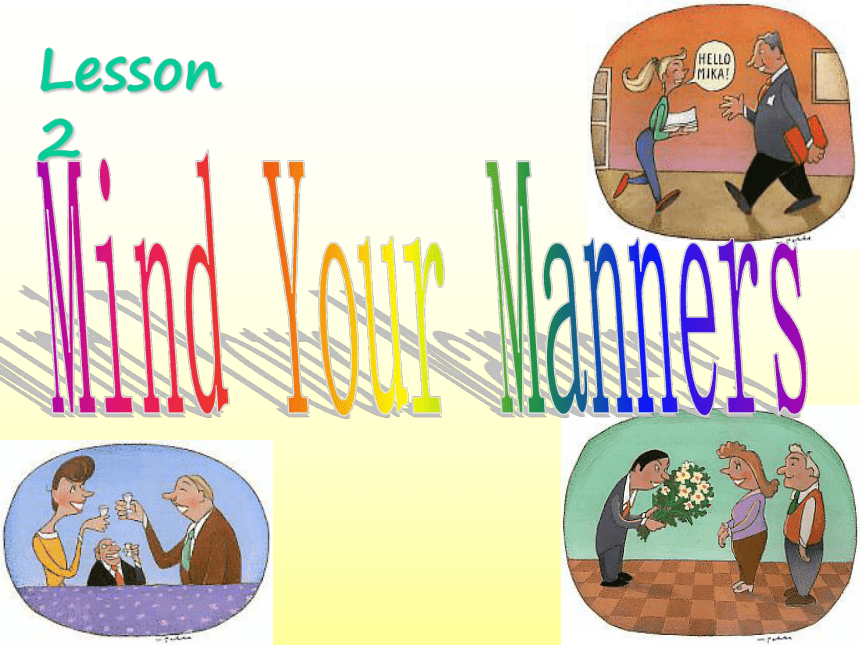
|
|
| 格式 | rar | ||
| 文件大小 | 3.1MB | ||
| 资源类型 | 教案 | ||
| 版本资源 | 北师大版 | ||
| 科目 | 英语 | ||
| 更新时间 | 2006-09-14 00:00:00 | ||
图片预览

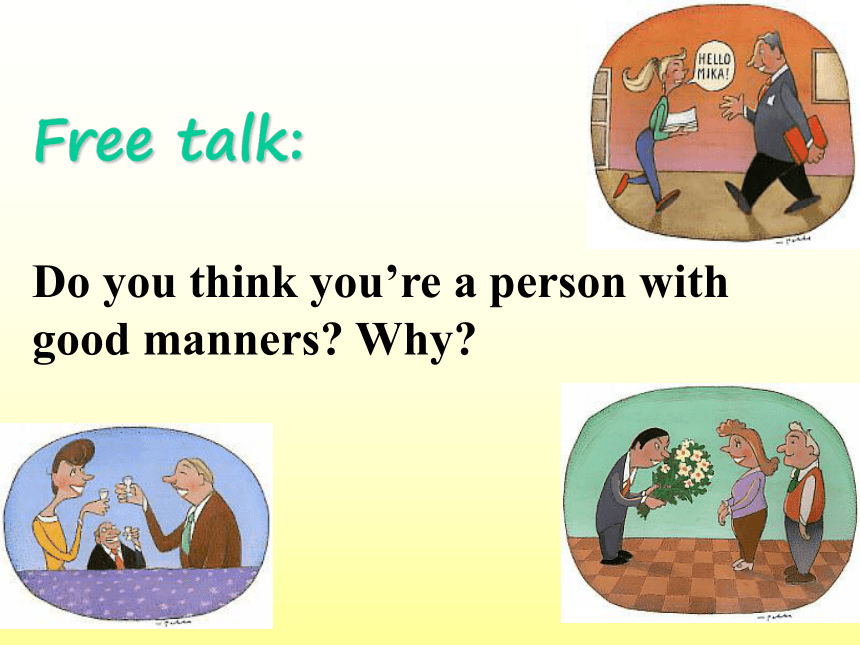
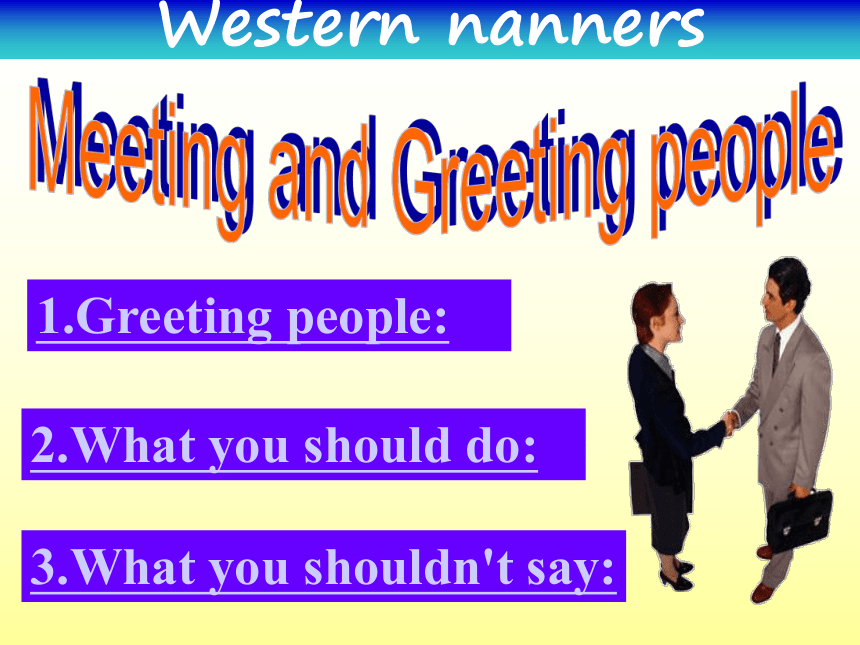
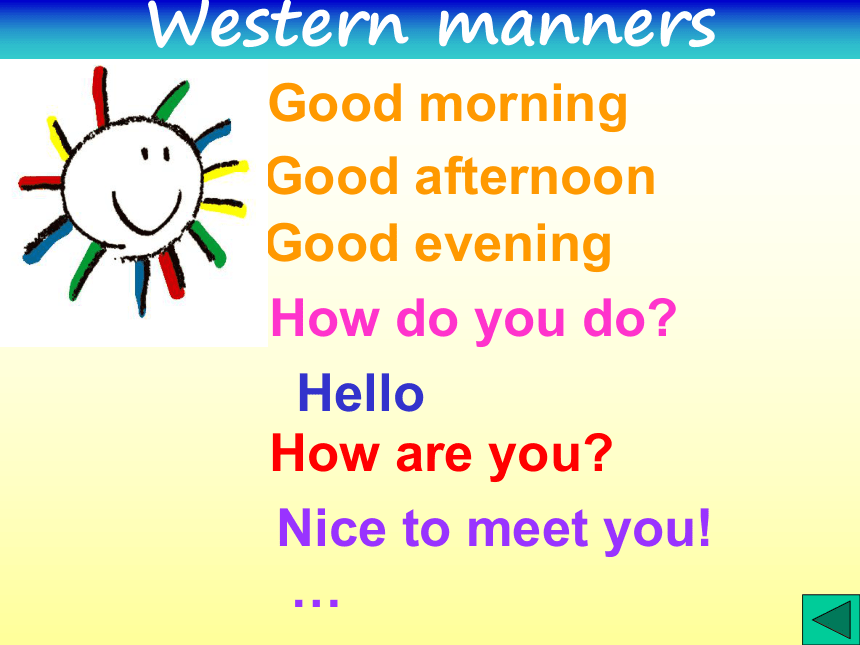
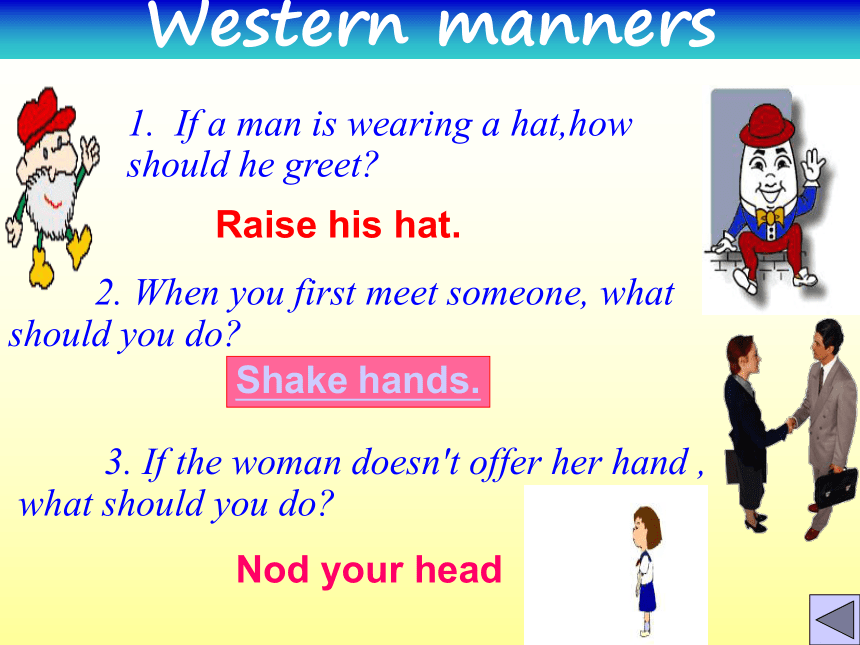

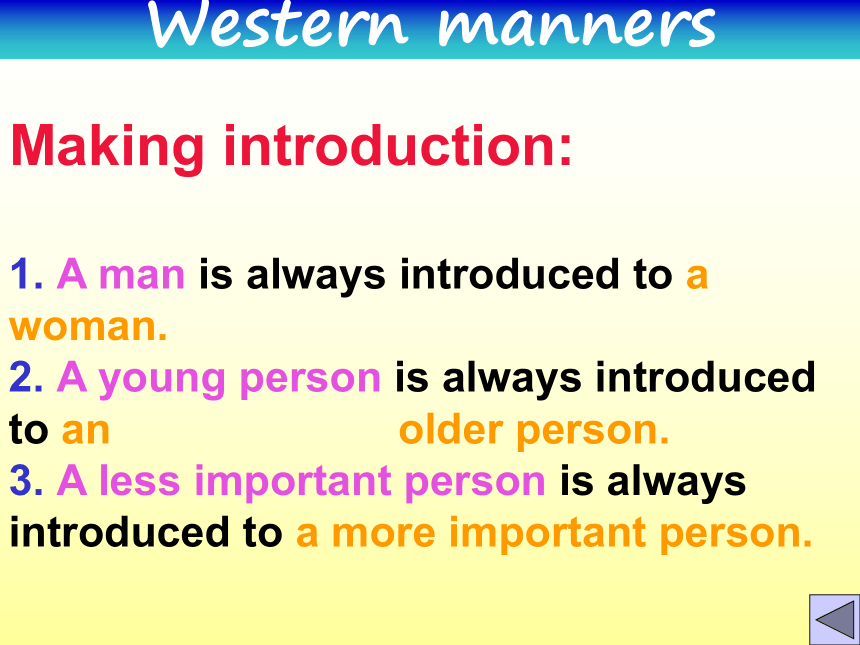
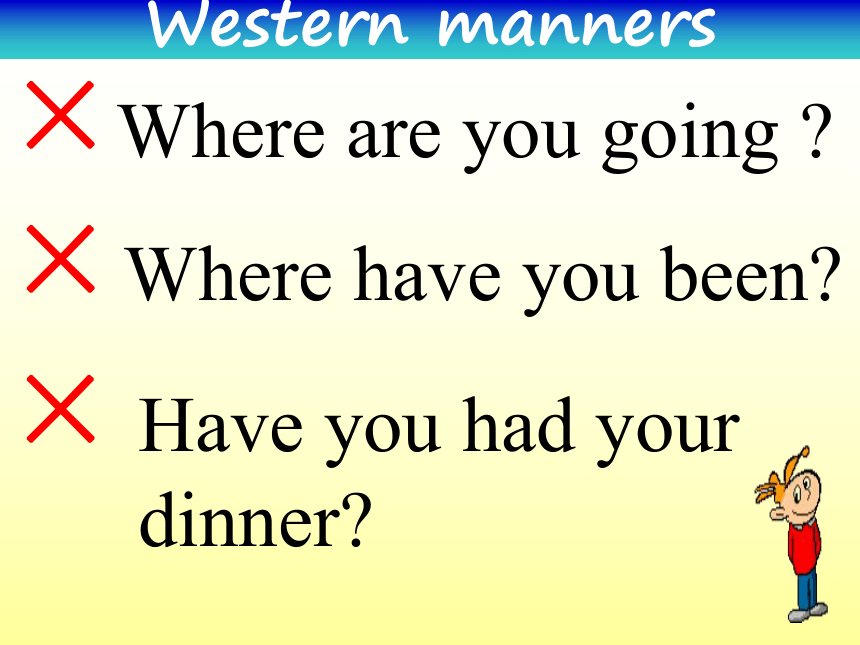
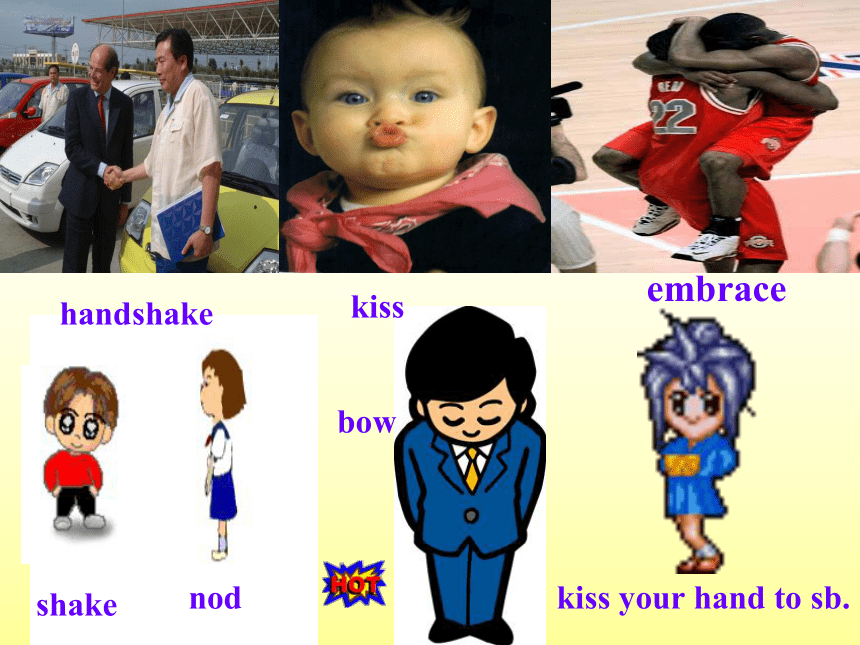
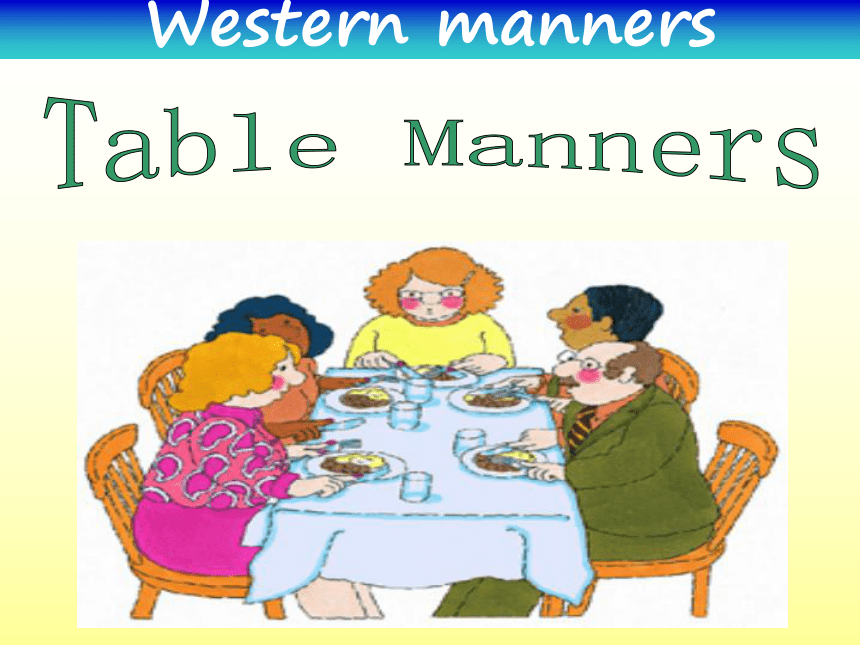
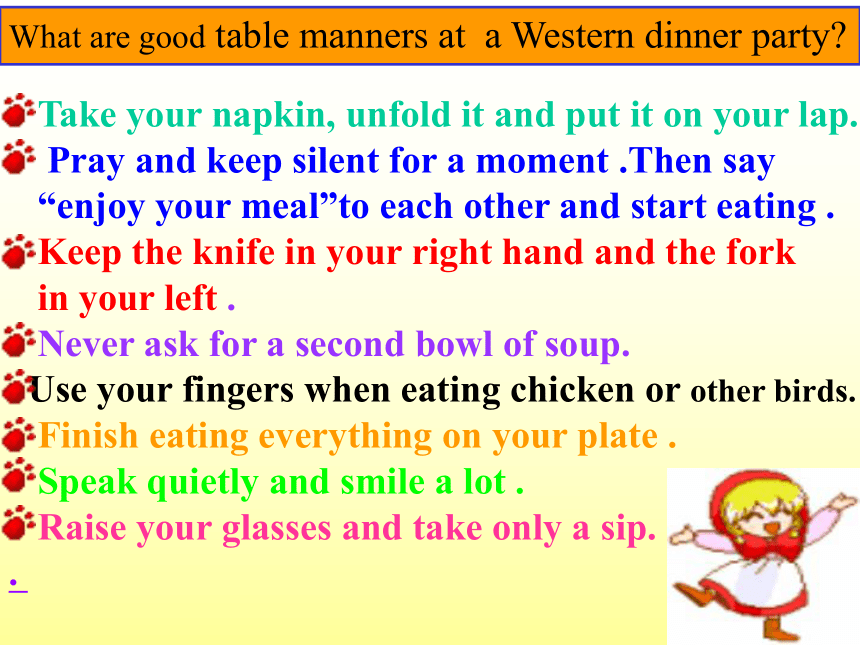
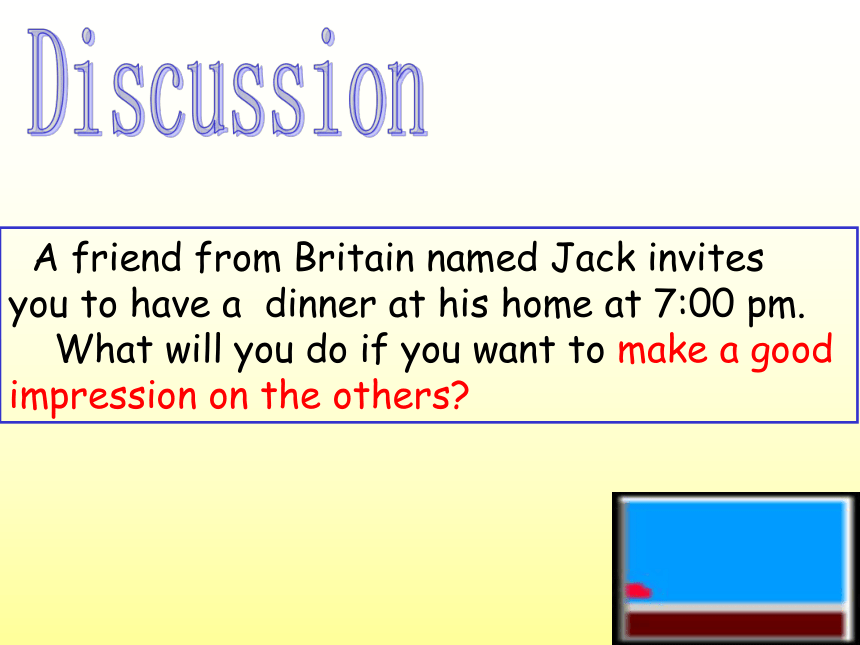
文档简介
课件70张PPT。Mind Your MannersLesson 2 Free talk: Do you think you’re a person with good manners? Why?Meeting and Greeting people1.Greeting people:2.What you should do:3.What you shouldn't say:Western nannersGood morningGood afternoonGood eveningHow do you do?HelloHow are you?Western mannersNice to meet you!…Raise his hat.1. If a man is wearing a hat,how should he greet? 2. When you first meet someone, what should you do?Shake hands. 3. If the woman doesn't offer her hand ,
what should you do?Nod your headWestern manners Shaking hands:Adults offer hands to children first
A woman offers her hand first
An older person starts a handshake
with a younger one
4. The more important person is the first to offer his or her handWestern mannersMaking introduction:
1. A man is always introduced to a woman.
2. A young person is always introduced to an older person.
3. A less important person is always introduced to a more important person.Western mannersWhere are you going ?Where have you been?Have you had your dinner?×××Western manners handshakekissembraceshake nodbow kiss your hand to sb.Table MannersWestern mannersWhat are good table manners at a Western dinner party? Take your napkin, unfold it and put it on your lap.
Pray and keep silent for a moment .Then say
“enjoy your meal”to each other and start eating .
Keep the knife in your right hand and the fork
in your left .
Never ask for a second bowl of soup.
Use your fingers when eating chicken or other birds.
Finish eating everything on your plate .
Speak quietly and smile a lot .
Raise your glasses and take only a sip.
. A friend from Britain named Jack invites
you to have a dinner at his home at 7:00 pm.
What will you do if you want to make a good
impression on the others?DiscussionArrive on time .Say thanks and goodbyeFollow table manners Knowing the manners will help you
makea good impression…Task 1 Listen to the dialogues and complete the
Function File. Dialogue 1: FormalChristina: Excuse me? Could you pass the
salt, (1)______ ?
Man: Yes, certainly.
Christina: (2)_________.
Man: You’re (3)_______.pleaseThank youwelcomeBeing politeDialogue 2: InformalBoy: So what do you think we should do this
weekend? What about going bowling
again?
Girl: Yeah, last time we went it was great!
Or we could take our flashlights …
Christina: Er, I’d (4)_______ not, thanks.
I’d rathe stay cosy and read my novel.
Girl: All right, Or how about going to the
circusratherDialogue 3: FormalChristina: (5)_________, Mrs Davis?
Do you think I (6)____ speak to
you?
Mrs Davis: Yes, dear.
Christina: Would you (7)_____ giving me and
my classmate a lift to school? We need …
Mrs Davis: Of course not. In about ten
minutes, Ok? We can go in the jeep.
Christina: Thanks a lot. That’s very (8)____
of you.
Mrs Davis: It’s no (9)_ ______. Any time.Excuse mecouldmindkindtroubleDialogue 4: InformalBoy: Hi, Christina. Have you got the blankets
and sheets you borrowed?
Christina: Oh, I’ve forgotten them! I’m
(10)____________.
Boy: That’s Okay, bring them tomorrow. I
need them for our camping trip.
Christina: Yes, I will, I (11)________.really sorrypromiseListen again, say after it, and
match the pictures with the
Dialogues.
( P38 EX 4 )Task 2Task 1 Listen to the dialogues and complete the
Function File. Dialogue 1: FormalChristina: Excuse me? Could you pass the
salt, (1)______ ?
Man: Yes, certainly.
Christina: (2)_________.
Man: You’re (3)_______.pleaseThank youwelcomeBeing politeDialogue 2: InformalBoy: So what do you think we should do this
weekend? What about going canoeing
again?
Girl: Yeah, last time we went it was great!
We could leave on Friday evening.
Christina: Er, I’d (4)_______ not, thanks.
I didn’t enjoy it much last time. But you
can all go.
Girl: All right, maybe. Or how about…ratherDialogue 3: FormalChristina: (5)_________, Mrs Davis?
Do you think I (6)____ have a word
with you?
Mrs Davis: Yes, dear.
Christina: Would you (7)_____ giving me a
lift to school?
Mrs Davis: Of course not. In about ten
minutes, Ok?
Christina: Thanks a lot. That’s very (8)____
of you.
Mrs Davis: It’s no (9)_______. Any time.Excuse mecouldmindkindtroubleDialogue 4: InformalBoy: Hi, Christina. Have you got that CD you
borrowed?
Christina: Oh, I’ve forgotten it! I’m
(10)____________.
Boy: That’s Okay, bring it tomorrow.
Christina: Yes, I will, I (11)________.really sorrypromiseTask 3 Make a list of the expressions in the Function
File we use. a) to ask for something politelyExcuse me, could you pass the salt, please?b) to reply to someone’s thanksYou’re welcome.c) to politely refuse an invitationI’d rather not, thanks. / It’s no trouble! Any time.d) to make a request to someone you don’t
know very welle) to thank someone for doing something
for youDo you think I could have a word with you?
Would you mind giving me a lift to school?Thanks a lot. That’s very kind of you.f) to apologise to a friendOh, I’ve forgotten it! I’m really sorry.Group 1: Ask a stranger to close a
window on a train.
Group 2: Decide with a friend what to
do at the weekend.
Group 3: Ask a waiter to give you the
menu.
Group 4: Decide where to go on
holiday with a friend.
Make a dialogue with your partner according
to the situation above. Imagine what happens.Task 4:Role-playsSpeaking StrategiesDecide how formal or informal the situation
is.
2. Decide which role you are going to play.
3. Pay attention to the suitable expressions.
You can use some expressions from the
Function File.
4.Pay attention to the intonation.SHOWING A LOT OF FEELINGSSHOWING NO FEELINGS“Open” cultures:
Showing every-
thing they feelMixed cultures:
In between “open”
and “closed” cultures“Closed” cultures:
Not showing their
feelingsJapanese
British
Americans
Italians
ItaliansJapaneseBritishAmericansChinesequieter
shyer
more modestTask 5Task 5 Listen to Part 1 of the interview about
communication in different cultures. Compare
what the expert says with your answers from
Ex 1.Don’t worry if you can’t understand everything. Listen for important words and phrases.Listening
Strategies:Task 6Pre-listening: Discuss and complete the table. Americans√xx√Listening Strategies1. Make sure you know what you have to do.
2. Use the headings or topics from the table to
help you while you’re listening.Task 7 While- listening : Listen to Part 2 of the interview , and fill in the blanks. 1. People from “open” cultures, like the_________, tend to use a lot more ________ movements. People in more “closed” cultures, like the __________, ___________ Europeans and even ____________, don’t use hand movements nearly as much.ItalianshandJapaneseNorthernAmericansTask 8Post – listening: Discuss and complete the table (check). Americans√x√x√xxxTask 7While – listening: Listen to Part 2 of the interview , and fill in the blanks. Americans2. People from _______ cultures usually look more _______ at the person they are speaking to. The ________and __________often look at people to start _____and then they look_____. People from Eastern cultures like _________, ______ look directly at the other person. To look at someone very directly is extremely _______.“open”directlyBritishJapanAmericanswithawayneverrudeTask 8Post – listening: Discuss and complete the table (check). Americans√x√x√xxxxxx√Task 7While – listening: Listen to Part 2 of the interview , and fill in the blanks. 3. People from _______cultures are more likely to ________ or speak at the ____ time as the other person. In ________ cultures, one person starts speaking _____ when the other has _______. In a place like ________, people _____ interrupt each other. They also wait for a while before _________, so there is more ______ _ . “open” interruptsame speaking“closed” neveronlystoppedJapansilenceTask 8Post – listening: Discuss and complete the table (check). Americans√x√x√xxxxxx√√xxxTask 7 Listen to Part 2 of the interview , and fill
in the blanks. 4. _________and _______ people seem more polite than ___________ and people from ____ cultures. ______ people usually use “please”, “Thank you” and “I’m sorry” more often. In _______, it is very important to say “please” and “thank you” even for the ________ things. If you don’t, it sounds very rude. In some other cultures, like _______ cultures, to say “please” and “thank you” all the time sounds a bit false. JapaneseAmericansBritishBritishLatinBritainsmallestLatinTask 8Post – listening: Discuss and complete the table (check). Americans√x√x√xxxxxx√√xxxx√x√xxx√Comparing Cultures√Guessing games anger fear joy sorrow contempt
轻视 surprisedisgust
厌恶Different facial expressions show different feelings:1235467Thumbs up!Thumbs down!Bite your nails!Kiss your hand to sb.!Make a face!Keep your fingers crossed!Touch your stomach!Do it! Turn left and Sit down!Action show Politeness costs nothing
but gains everything.礼貌不用花钱,却能赢得一切。 When in Rome, do as
the Romans do.入乡随俗.Summary1. Homework1. Write a short report to describe Chinese people.
Are they open or closed? Is formal language very
different from informal language? (Some
information may be available on the Internet).
2. Finish Ex 9 on Page 39.Be careful about pointing the finger at others.
After all, the rest of your fingers are pointing
at you.Hand movementsbow crylook up and downfeel cold sound sleepGuessing game dance sad nervousvictory look around angry shy laughing I am full. nodsingthinking smoke kisswelcome confused
(困惑的)angrysadhappytiredDifferent facial expressions show different feelings:Funny timelooking down upon sb. Facial expressionsFacial expressionsSwearing
(发誓)thinkingGuessing gamedisappointed shy 文化背景导入 You speak, write a letter, make a telephone call. Your words carry a message. People communicate with words. But do you think that you can communicate without words? A smile on your face shows you are happy and friendly. Tears in your eyes tell other others that you are sad. When you raise your hand in class. The teacher knows that you want to say something or ask questions. You shake your head, and people know your saying “No”. You nod, and people know you are saying “Yes”. People can use body languages to communicate with others.TABLE MANNERS AT A DINNER PARTY
!f you go to a western dinner party for the first time, you may be surprised by table manners in western culture. Knowing them will help you make a good impression. You should know how to use
forks and knives, how to toast and how to behave at the table.
For example, you can find three glasses -- one for white wine, one for red wine and another for water, two pairs of large knives and forks on the table, forks on the left and knives on the right of the plate.
There are also two spoons, the big one for the soup and the small one for the dessert. The knife and fork that are closest to your plate are a little bigger than the ones beside them.
Dinner starts with a small dish -- a starter. Some people pray before eating and many people keep silent for a moment. You eat the starter with the smaller pair of fork and knife beside the bigger one, and keep the knife in your right hand and the fork in your left hand. The next dish is the main dish. You can only use your fingers when eating chicken. It is polite to finish eating everything on your plate.
At table you should try to speak quietly and smile a lot, but do not laugh all the time. When drinking to someone's health, you raise your glasses, but the glasses should not touch, Usually westerners take only a sip, but never drink too much.
Table manners change over time. They follow the fashion of the time.宴会上的就餐礼节
如果你第一次出席西方的宴会,也许会对西方的就餐文化痞到惊讶。了解这些文化会帮你给别人留下一个良好的印象,你要了解在餐桌上怎样使用刀、叉,怎样祝酒,怎样表现。
例如:在餐桌上,你会看到有三只杯子,一只装白酒,一只装红酒,另一只装水;有两副大刀叉,叉摆在盘子的左边,刀在右边;还有两把勺子,大的用来喝汤,小的用来吃甜点。最靠近盘子的刀叉大一点,在这副刀叉旁边的刀叉小‘点。
宴会一开始上一道小菜——首道菜,有些人在开始吃饭前做祈祷,许多人沉默一会儿,然后用大刀叉旁的那幅小刀叉吃首道莱,左手握叉,右手握刀。接下来上主菜,只有在吃鸡时才允许用手指。吃光你盘子里的东西是礼貌的行为。
吃饭时,要静静地讲话,要多微笑,不要大声谈笑。举杯祝酒时,并不碰杯,西方人通常只呷一口,而不喝得太多。
就餐礼节在不断地变化,要遵循时代的风尚。 same gesture, different meanings eye contactOK thumbs up show interest (usually) be rude or disrespectful money (in Japan) zero (in France) rudeness ( in Brazil,
Germany) great / good job( in USA)rude (in Nigeria) the number one (in
Germany, Japan)A:___________. Can I come in ?
B:___________. We’ve already started.
A:___________. I missed the bus.
B:___________. We’re on page 47.Sure I’m sorry
That’s OK Excuse me Excuse meSureI’m sorryThat’s OKA:__________.May I interrupt
you for a moment?
B:__________. Jordan?
A:__________. Mr Baker. I
put my homework on your
desk.
Excuse meWhat is itI’m sorryWhat is it
Excuse me
I’m sorryA: Hey, __________!
B: Oh, ___________.
A: That’s all right.
be carefulI’m sorryI’m sorry
be carefulA: Ouch! _________________?!
B: ______________________.
What are you doingI’m terribly sorryI’m terribly sorry
What are you doing2. At the airport, Tony met his friend Jack and Jack’s grandfather.Situations: 1. At the library, Lucy and her classmate Tom met Lucy’s friend Lisa. 3. At the supermarket, Mr. Green met his student Jane and her mother.
what should you do?Nod your headWestern manners Shaking hands:Adults offer hands to children first
A woman offers her hand first
An older person starts a handshake
with a younger one
4. The more important person is the first to offer his or her handWestern mannersMaking introduction:
1. A man is always introduced to a woman.
2. A young person is always introduced to an older person.
3. A less important person is always introduced to a more important person.Western mannersWhere are you going ?Where have you been?Have you had your dinner?×××Western manners handshakekissembraceshake nodbow kiss your hand to sb.Table MannersWestern mannersWhat are good table manners at a Western dinner party? Take your napkin, unfold it and put it on your lap.
Pray and keep silent for a moment .Then say
“enjoy your meal”to each other and start eating .
Keep the knife in your right hand and the fork
in your left .
Never ask for a second bowl of soup.
Use your fingers when eating chicken or other birds.
Finish eating everything on your plate .
Speak quietly and smile a lot .
Raise your glasses and take only a sip.
. A friend from Britain named Jack invites
you to have a dinner at his home at 7:00 pm.
What will you do if you want to make a good
impression on the others?DiscussionArrive on time .Say thanks and goodbyeFollow table manners Knowing the manners will help you
makea good impression…Task 1 Listen to the dialogues and complete the
Function File. Dialogue 1: FormalChristina: Excuse me? Could you pass the
salt, (1)______ ?
Man: Yes, certainly.
Christina: (2)_________.
Man: You’re (3)_______.pleaseThank youwelcomeBeing politeDialogue 2: InformalBoy: So what do you think we should do this
weekend? What about going bowling
again?
Girl: Yeah, last time we went it was great!
Or we could take our flashlights …
Christina: Er, I’d (4)_______ not, thanks.
I’d rathe stay cosy and read my novel.
Girl: All right, Or how about going to the
circusratherDialogue 3: FormalChristina: (5)_________, Mrs Davis?
Do you think I (6)____ speak to
you?
Mrs Davis: Yes, dear.
Christina: Would you (7)_____ giving me and
my classmate a lift to school? We need …
Mrs Davis: Of course not. In about ten
minutes, Ok? We can go in the jeep.
Christina: Thanks a lot. That’s very (8)____
of you.
Mrs Davis: It’s no (9)_ ______. Any time.Excuse mecouldmindkindtroubleDialogue 4: InformalBoy: Hi, Christina. Have you got the blankets
and sheets you borrowed?
Christina: Oh, I’ve forgotten them! I’m
(10)____________.
Boy: That’s Okay, bring them tomorrow. I
need them for our camping trip.
Christina: Yes, I will, I (11)________.really sorrypromiseListen again, say after it, and
match the pictures with the
Dialogues.
( P38 EX 4 )Task 2Task 1 Listen to the dialogues and complete the
Function File. Dialogue 1: FormalChristina: Excuse me? Could you pass the
salt, (1)______ ?
Man: Yes, certainly.
Christina: (2)_________.
Man: You’re (3)_______.pleaseThank youwelcomeBeing politeDialogue 2: InformalBoy: So what do you think we should do this
weekend? What about going canoeing
again?
Girl: Yeah, last time we went it was great!
We could leave on Friday evening.
Christina: Er, I’d (4)_______ not, thanks.
I didn’t enjoy it much last time. But you
can all go.
Girl: All right, maybe. Or how about…ratherDialogue 3: FormalChristina: (5)_________, Mrs Davis?
Do you think I (6)____ have a word
with you?
Mrs Davis: Yes, dear.
Christina: Would you (7)_____ giving me a
lift to school?
Mrs Davis: Of course not. In about ten
minutes, Ok?
Christina: Thanks a lot. That’s very (8)____
of you.
Mrs Davis: It’s no (9)_______. Any time.Excuse mecouldmindkindtroubleDialogue 4: InformalBoy: Hi, Christina. Have you got that CD you
borrowed?
Christina: Oh, I’ve forgotten it! I’m
(10)____________.
Boy: That’s Okay, bring it tomorrow.
Christina: Yes, I will, I (11)________.really sorrypromiseTask 3 Make a list of the expressions in the Function
File we use. a) to ask for something politelyExcuse me, could you pass the salt, please?b) to reply to someone’s thanksYou’re welcome.c) to politely refuse an invitationI’d rather not, thanks. / It’s no trouble! Any time.d) to make a request to someone you don’t
know very welle) to thank someone for doing something
for youDo you think I could have a word with you?
Would you mind giving me a lift to school?Thanks a lot. That’s very kind of you.f) to apologise to a friendOh, I’ve forgotten it! I’m really sorry.Group 1: Ask a stranger to close a
window on a train.
Group 2: Decide with a friend what to
do at the weekend.
Group 3: Ask a waiter to give you the
menu.
Group 4: Decide where to go on
holiday with a friend.
Make a dialogue with your partner according
to the situation above. Imagine what happens.Task 4:Role-playsSpeaking StrategiesDecide how formal or informal the situation
is.
2. Decide which role you are going to play.
3. Pay attention to the suitable expressions.
You can use some expressions from the
Function File.
4.Pay attention to the intonation.SHOWING A LOT OF FEELINGSSHOWING NO FEELINGS“Open” cultures:
Showing every-
thing they feelMixed cultures:
In between “open”
and “closed” cultures“Closed” cultures:
Not showing their
feelingsJapanese
British
Americans
Italians
ItaliansJapaneseBritishAmericansChinesequieter
shyer
more modestTask 5Task 5 Listen to Part 1 of the interview about
communication in different cultures. Compare
what the expert says with your answers from
Ex 1.Don’t worry if you can’t understand everything. Listen for important words and phrases.Listening
Strategies:Task 6Pre-listening: Discuss and complete the table. Americans√xx√Listening Strategies1. Make sure you know what you have to do.
2. Use the headings or topics from the table to
help you while you’re listening.Task 7 While- listening : Listen to Part 2 of the interview , and fill in the blanks. 1. People from “open” cultures, like the_________, tend to use a lot more ________ movements. People in more “closed” cultures, like the __________, ___________ Europeans and even ____________, don’t use hand movements nearly as much.ItalianshandJapaneseNorthernAmericansTask 8Post – listening: Discuss and complete the table (check). Americans√x√x√xxxTask 7While – listening: Listen to Part 2 of the interview , and fill in the blanks. Americans2. People from _______ cultures usually look more _______ at the person they are speaking to. The ________and __________often look at people to start _____and then they look_____. People from Eastern cultures like _________, ______ look directly at the other person. To look at someone very directly is extremely _______.“open”directlyBritishJapanAmericanswithawayneverrudeTask 8Post – listening: Discuss and complete the table (check). Americans√x√x√xxxxxx√Task 7While – listening: Listen to Part 2 of the interview , and fill in the blanks. 3. People from _______cultures are more likely to ________ or speak at the ____ time as the other person. In ________ cultures, one person starts speaking _____ when the other has _______. In a place like ________, people _____ interrupt each other. They also wait for a while before _________, so there is more ______ _ . “open” interruptsame speaking“closed” neveronlystoppedJapansilenceTask 8Post – listening: Discuss and complete the table (check). Americans√x√x√xxxxxx√√xxxTask 7 Listen to Part 2 of the interview , and fill
in the blanks. 4. _________and _______ people seem more polite than ___________ and people from ____ cultures. ______ people usually use “please”, “Thank you” and “I’m sorry” more often. In _______, it is very important to say “please” and “thank you” even for the ________ things. If you don’t, it sounds very rude. In some other cultures, like _______ cultures, to say “please” and “thank you” all the time sounds a bit false. JapaneseAmericansBritishBritishLatinBritainsmallestLatinTask 8Post – listening: Discuss and complete the table (check). Americans√x√x√xxxxxx√√xxxx√x√xxx√Comparing Cultures√Guessing games anger fear joy sorrow contempt
轻视 surprisedisgust
厌恶Different facial expressions show different feelings:1235467Thumbs up!Thumbs down!Bite your nails!Kiss your hand to sb.!Make a face!Keep your fingers crossed!Touch your stomach!Do it! Turn left and Sit down!Action show Politeness costs nothing
but gains everything.礼貌不用花钱,却能赢得一切。 When in Rome, do as
the Romans do.入乡随俗.Summary1. Homework1. Write a short report to describe Chinese people.
Are they open or closed? Is formal language very
different from informal language? (Some
information may be available on the Internet).
2. Finish Ex 9 on Page 39.Be careful about pointing the finger at others.
After all, the rest of your fingers are pointing
at you.Hand movementsbow crylook up and downfeel cold sound sleepGuessing game dance sad nervousvictory look around angry shy laughing I am full. nodsingthinking smoke kisswelcome confused
(困惑的)angrysadhappytiredDifferent facial expressions show different feelings:Funny timelooking down upon sb. Facial expressionsFacial expressionsSwearing
(发誓)thinkingGuessing gamedisappointed shy 文化背景导入 You speak, write a letter, make a telephone call. Your words carry a message. People communicate with words. But do you think that you can communicate without words? A smile on your face shows you are happy and friendly. Tears in your eyes tell other others that you are sad. When you raise your hand in class. The teacher knows that you want to say something or ask questions. You shake your head, and people know your saying “No”. You nod, and people know you are saying “Yes”. People can use body languages to communicate with others.TABLE MANNERS AT A DINNER PARTY
!f you go to a western dinner party for the first time, you may be surprised by table manners in western culture. Knowing them will help you make a good impression. You should know how to use
forks and knives, how to toast and how to behave at the table.
For example, you can find three glasses -- one for white wine, one for red wine and another for water, two pairs of large knives and forks on the table, forks on the left and knives on the right of the plate.
There are also two spoons, the big one for the soup and the small one for the dessert. The knife and fork that are closest to your plate are a little bigger than the ones beside them.
Dinner starts with a small dish -- a starter. Some people pray before eating and many people keep silent for a moment. You eat the starter with the smaller pair of fork and knife beside the bigger one, and keep the knife in your right hand and the fork in your left hand. The next dish is the main dish. You can only use your fingers when eating chicken. It is polite to finish eating everything on your plate.
At table you should try to speak quietly and smile a lot, but do not laugh all the time. When drinking to someone's health, you raise your glasses, but the glasses should not touch, Usually westerners take only a sip, but never drink too much.
Table manners change over time. They follow the fashion of the time.宴会上的就餐礼节
如果你第一次出席西方的宴会,也许会对西方的就餐文化痞到惊讶。了解这些文化会帮你给别人留下一个良好的印象,你要了解在餐桌上怎样使用刀、叉,怎样祝酒,怎样表现。
例如:在餐桌上,你会看到有三只杯子,一只装白酒,一只装红酒,另一只装水;有两副大刀叉,叉摆在盘子的左边,刀在右边;还有两把勺子,大的用来喝汤,小的用来吃甜点。最靠近盘子的刀叉大一点,在这副刀叉旁边的刀叉小‘点。
宴会一开始上一道小菜——首道菜,有些人在开始吃饭前做祈祷,许多人沉默一会儿,然后用大刀叉旁的那幅小刀叉吃首道莱,左手握叉,右手握刀。接下来上主菜,只有在吃鸡时才允许用手指。吃光你盘子里的东西是礼貌的行为。
吃饭时,要静静地讲话,要多微笑,不要大声谈笑。举杯祝酒时,并不碰杯,西方人通常只呷一口,而不喝得太多。
就餐礼节在不断地变化,要遵循时代的风尚。 same gesture, different meanings eye contactOK thumbs up show interest (usually) be rude or disrespectful money (in Japan) zero (in France) rudeness ( in Brazil,
Germany) great / good job( in USA)rude (in Nigeria) the number one (in
Germany, Japan)A:___________. Can I come in ?
B:___________. We’ve already started.
A:___________. I missed the bus.
B:___________. We’re on page 47.Sure I’m sorry
That’s OK Excuse me Excuse meSureI’m sorryThat’s OKA:__________.May I interrupt
you for a moment?
B:__________. Jordan?
A:__________. Mr Baker. I
put my homework on your
desk.
Excuse meWhat is itI’m sorryWhat is it
Excuse me
I’m sorryA: Hey, __________!
B: Oh, ___________.
A: That’s all right.
be carefulI’m sorryI’m sorry
be carefulA: Ouch! _________________?!
B: ______________________.
What are you doingI’m terribly sorryI’m terribly sorry
What are you doing2. At the airport, Tony met his friend Jack and Jack’s grandfather.Situations: 1. At the library, Lucy and her classmate Tom met Lucy’s friend Lisa. 3. At the supermarket, Mr. Green met his student Jane and her mother.
